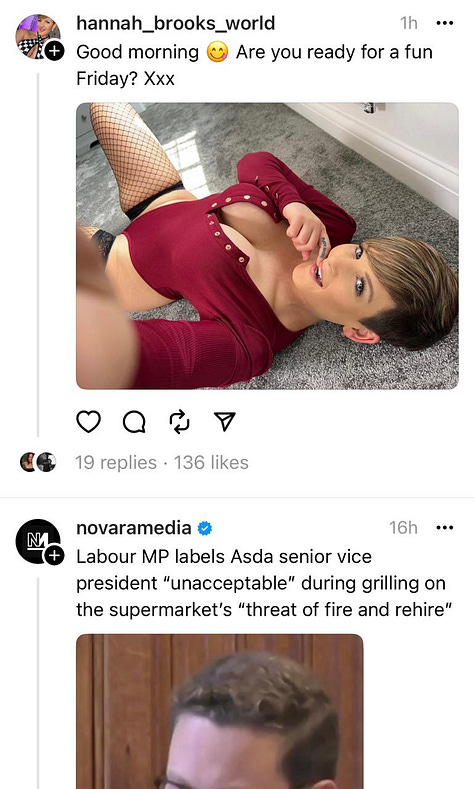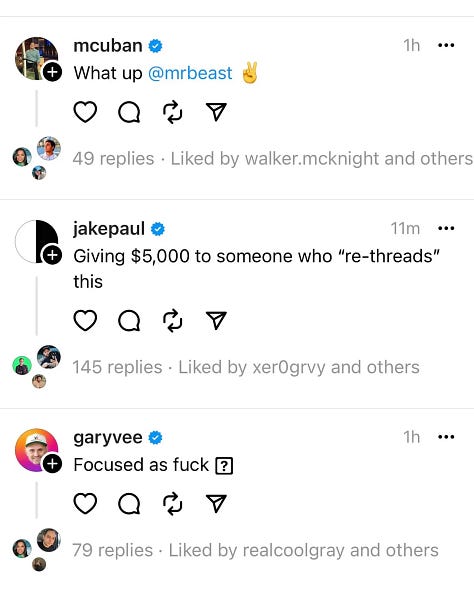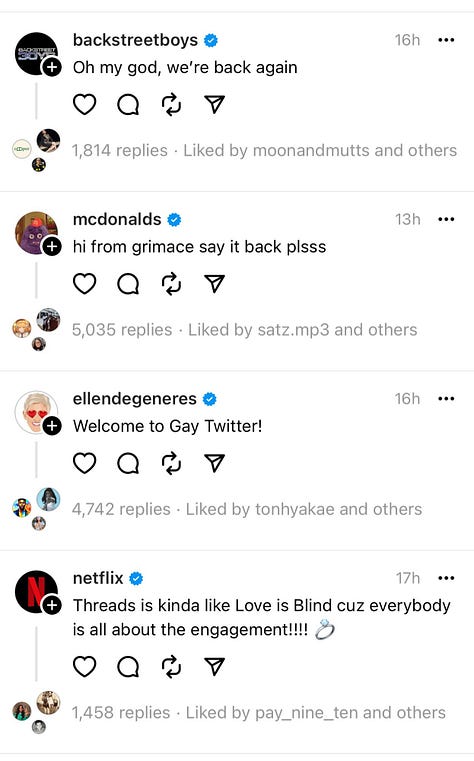Unravelling the Threads
... of the sheet that makes the spirit of the age visible
There's a box on the screen in which I can write. I click a button and, in an instant, the words are available for people to read. This is my life. It's my life when I am chatting with friends on my phone. It's my life at work when I am building websites. It's my life on a Sunday morning when I write this blog.
Recently there has been a proliferation of new boxes: Threads, Mastodon, Bluesky, and Notes. All are based on the same idea as Twitter: bite-sized thoughts sent out into the world.1
If Twitter was the closest thing we got to observing the zeitgeist in real time, these apps want to snatch the sheet that makes the spirit visible (👻). Their founders see Twitter as toxic, the algorithm inflammatory, and hope it’s not because of any inherent malignity in human nature.
Now, I am not an early adopter, but I like a blank canvas and have spent a few minutes on Threads trying to understand their design decisions.
In most respects, it is a direct clone of Twitter where you:
Post thoughts
Retweet and like other people’s posts
Comment on your own or anyone else’s post
The differences are minor:
500 character limit, rather than 280
Five minutes video instead of two
Ten photo limit, not four
So ... more stuff, as if the beauty of Twitter wasn’t its scroll-happy brevity.
Ultimately, though, it doesn’t matter what design decisions they make on Threads. People will put up with the crappiest design if the content is engaging enough. What’s more interesting is their community strategy, which avoids deathly silence in two ways. First, by using connections you’ve made on Instagram as a basis for the network. Second, by making your home feed a stream of everyone on the platform.
The 80-odd people I know on Instagram who are also on Threads don’t post enough to make a feed so what I get is a mix of corporations, adult entertainers, centrist political commentators, and people repackaging memes from other platforms. The home feed on Threads gives a fascinating insight into the state of mass culture and it is depressing.2
Influencers, rap, Taylor Swift, and basketball, are all things that I don't care about but which are massively popular. However, popularity is not the zeitgeist. Yesterday’s pop stars are tomorrow’s turkey farmers.






I started thinking of Threads as a game where you have to mute more accounts every day. You start off muting a few brands, move on to political grifters, and finally anyone who mildly annoys you. I have limited time on earth and don’t want to spend it in a perpetual state of annoyance. It is surely a greater waste to spend that time clicking the mute button. In a world that is so siloed maybe I should engage more with the mainstream.
What do we want? What do we need?
Most people seem to be looking for entertainment or information to help their political crusade. For volunteers in the culture war, every meme is a bullet fired from the trenches. Some people want to build an audience or share news about what they are doing.
Perhaps the beleaguered Threads could adapt Alasdair Gray’s line “Work as if you live in the early days of a better nation.” Post as if you live in the early days of a better social network (controlled by Mark Zuckerberg). This is certainly the vibe on Mastodon, which is where the people with ethical principles have ended up. When we sign up to a platform like Twitter or Threads we relinquish control to designers whose interests don’t always align with our own. The owners want us to engage with brands, create viral content, and ‘like’ posts to give people a dopamine boost. We sacrifice control for access to the network.
And yet I still want to use social media intentionally. For me, this means:
Follow a Dunbar’s number of people. I don’t understand people who follow thousands of accounts. I want to have meaningful relationships with everyone I follow or at least to be able to remember who they are.
Use lists as a way of dipping into topics that you find interesting. My urbanism one has a few followers, but my favourites are my literature and photography lists.
Check-in once a day … this one is rather more difficult but probably the most necessary.
Only write when you’re inspired, not just because you’re bored or because you think it will be popular.
I don’t get the sense that many people are using Twitter in a particularly strategic way (except, maybe, Zvi). And now it seems to be dying. Will we miss it? What do you want from such a service?
Below this paragraph is a button which will send you to a text input where you can write and publish a comment. I don't think we fully acknowledge the miracle of instant communication. Use this link and share your thoughts.
Sue Smith: “The year is 2025, there is now one social network for every twelve people in the world, each dedicated to discussing the other social networks that are available.”
I am reminded of Hamlet’s monologue from Act II Scene 2 of Hamlet:
I have of late, (but wherefore I know not) lost all my mirth, forgone all custom of exercises; and indeed, it goes so heavily with my disposition; that this goodly frame the earth, seems to me a sterile promontory; this most excellent canopy the air, look you, this brave o'er hanging firmament, this majestical roof, fretted with golden fire: why, it appeareth no other thing to me, than a foul and pestilent congregation of vapours. What a piece of work is a man, How noble in reason, how infinite in faculty, In form and moving how express and admirable, In action how like an Angel, In apprehension how like a god, The beauty of the world, The paragon of animals. And yet to me, what is this quintessence of dust?






I noticed today something I have noticed before and we should all bear in mind, when listening to Grayson Perry being interviewed on a podcast. He was talking about toxic debates online and he referred to 'the internet'. Purists think it's bad enough that the web has long been a synonym for 'the internet', but now it's now just social media that most people think of as 'the internet', which is a truly toxic state of affairs given the state of online discourse on such platforms and the controversy-for-clicks based algorithm-powered mire they are all in.